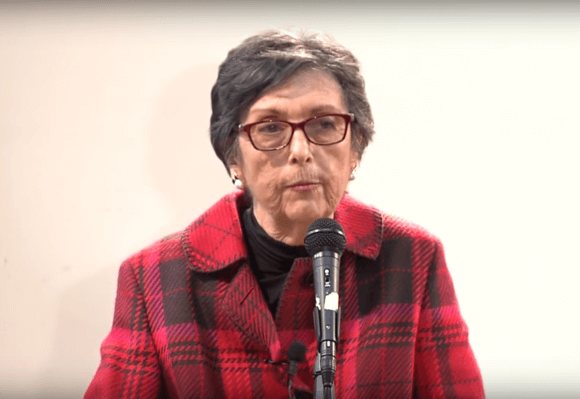Last week it was a little shocking to read a review in the New York Times of Bari Weiss’s book on anti-Semitism written by a rightwinger who raved about Weiss’s bravery in supporting Israel but sermonized against LGBTQ rights because they are not in the Bible.
Judaism fiercely opposed such an acceptance of sexual diversity, against which it championed the procreative family, the taming of anarchic passions, and the cosmically ordained nature of normative gender distinctions
The Times usually saves us from homophobia. Not in the case of reviewer Hillel Halkin, a religious Israeli-American of 80.
This week it is shocking to see a review of Tom Segev’s biography of David Ben-Gurion written by another ardent old-school Zionist that suggests that the Nakba or Palestinian catastrophe, in which 750,000 Palestinian refugees were created, was all of the Arabs’ making. Francine Klagsbrun writes that Segev makes the “questionable” suggestion that there was “a planned and systematic scheme to push out the Arabs.”
In reality, the exodus of the Arabs from the designated Jewish state — the origin of the Palestinian refugee problem — is in itself a hotly debated subject. Scholars disagree about how many villagers left of their own accord and how many were expelled by Israeli commanders. There is no evidence that Ben-Gurion gave a central order to evacuate them all. He seemed surprised at first by the emptying villages, only later regarding the Arab flight as a boon to the military.
The idea that the Palestinian refugee problem was created by Palestinians who decided to leave “of their own accord” is a staggering denial of a historical human rights atrocity, in the pages of the New York Times. Deniers of other atrocities would never get such a platform from the Times.
We’d like to point out that in both cases, the conservative prejudice on the part of the reviewer was entirely predictable.
Halkin is noted for fire-and-brimstone zealotry. His book “Letters to an American Jewish Friend” (1977) expresses contempt for intermarrying American Jews as traitors to Jewish history, and says that Jews who don’t move to Israel are not shouldering their duty to the Jewish people, including their obligation to create Jewish babies to outpace the production of Palestinian babies.
“[W]e are engaged in a population race with an Arab minority whose outcome can prove as fateful to us as that of any military or political development. . . The plain truth is that Israel can continue to behave in a relatively democratic manner toward its Arab minority, to say nothing of extending its civil rights further, only if the latter does not grow proportionally large as to call into question the distinctively Jewish character of the state. . . “
The book cited Jewish biblical claims to Palestine as land-grants, diminished Palestinian suffering as far less than Jewish suffering, and described the Nakba as “our unavoidably violent return to this land.”
Francine Klagsbrun is also an ardent Zionist who has little concern for Palestinian human rights. Her book “Lioness: Golda Meir and the Nation of Israel” came out last year and never uses the word Nakba, but describes the expulsion and flight of Palestinians as a kind of miracle for the Jewish state.
“To the amazement of Jewish leaders,” Klagsbrun writes in that biography, as the Haganah (the Zionist army) approached Haifa, Tiberias, Safed and other cities in spring 1948, “tens of thousands of Arabs fled.” For decades to come,
controversy would swirl around the question of whether the Arabs had abandoned their homes because their leaders ordered them to, Jewish armies expelled them, or fears of a Jewish conquest overwhelmed them. At various times, all these factors came into play. In this early stage, however, the Haganah seems to have forcibly evacuated very few villages; inhabitants of others fled on their own.
Klagsbrun also dismisses the massacre at Deir Yassin in April 1948 as an aberration that fostered irrational panic among Palestinians. “Horrified, the Hagana and Jewish Agency strongly condemned the action,” she writes. Palestinians fled Haifa even as the Haganah assured them they could live as “equal and free” citizens. Golda Meir is seen begging Arabs not to leave Haifa.
The only answer to this propaganda is, If it was such a big mistake, how come the refugees weren’t welcome back to their property? Klagsbrun sneers at the idea that refugees had any “rights,” and valorizes Golda Meir’s statement that the right of return would mean the end of Israel. That premise for the state’s continued existence has made more than one person an anti-Zionist.
Klagsbrun also wrote a piece earlier this summer, The Imperative for an American Jewish Zionism, in which she describes Zionism as a liberation movement for the “entire Jewish people,” says Zionism has “grounded” American Jews, and adds that Americans and Israelis must be “partners in Zionism.”
So Klagsbrun’s dismissive review of a book by one of Israel’s courageous “New Historians” was completely predictable.
That’s the bottom line here. The New York Times, which 60 and 70 years ago was an anti-Zionist newspaper, continues to demonstrate its dedication to Zionism when Israel is under great intellectual and journalistic challenge. The Times has five or six Zionist columnists, but no anti-Zionists to speak of. Four Times writers have had sons serving in the Israeli Defence Forces. Last year the paper published four defenses of Israel’s slaughter of Palestinian demonstrators in Gaza, a propaganda service it would never provide for Palestinian armed resistance. Last week the Times said it was important for Benny Gantz to replace Netanyahu so that Israel could reverse the “dangerous shift” of its image, which is prompting Democrats to start challenging support for Israel. The Dems are doing so because many progressives regard this as an important issue. The Times is dug in, and dug in for a reason.
Thanks to Donald Johnson, who comments on the Segev review: “This is history these people are playing with. The NYT is telling its liberal readers that the Nakba is still a subject up for debate in its basics, and the expulsion of Palestinians is a notion put forth by radical revisionist historians with controversial views.”



Tom Segev: ” ‘Disappearing’ the Arabs lay at the heart of the Zionist dream, and was also a necessary condition of its realization.” – from page 21 of Ben White’s “Israeli Apartheid: A Beginners Guide”. (“One Palestine, Complete” by Tom Segev, page 405)
strange, to have a book by a professional historian reviewed by an amateur, and a very biased one
The decisive fact was the exclusion of non-Jews who has fled the war zone from their former homes. There was no right to do this. It doesn’t matter whether it was planned for decades or was a stroke of evil genius on the spur of the moment. There has never been any resolution of the problems thus created.
This is hardly controversial any more – unless, of course, you are a Zionist intent on defending Israel right or wrong. Uri Avnery, who was a young soldier in 1948, found Arab homes with hot food on the tables.
And Arabs who fled after Deir Yassin were hardly irrational.
“Scholars disagree about how many villagers left of their own accord and how many were expelled by Israeli commanders”
Nakba denial is rapidly reaching the status of Holocaust denial.
Since the actions/inactions of the British Administration at the time were pivotal to the horrors which were unleashed on a virtually defenceless native Palestinian population perhaps it is long past time for a Nakba memorial sculpture to be erected in Central London not withstanding the screams , shrieks and weeping and wailing about IHRA standard breaching “Anti – Semitism” which would no doubt erupt.
As for “leaving of their own accord”. Arguably as sick and as twisted as a Holocaust denier claiming that Jews went to the camps of their own accord.